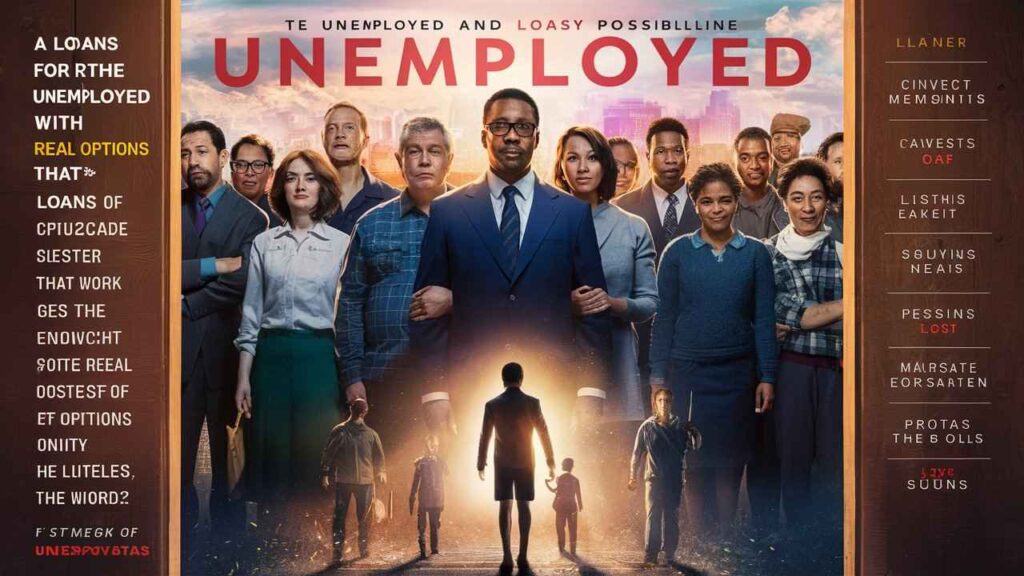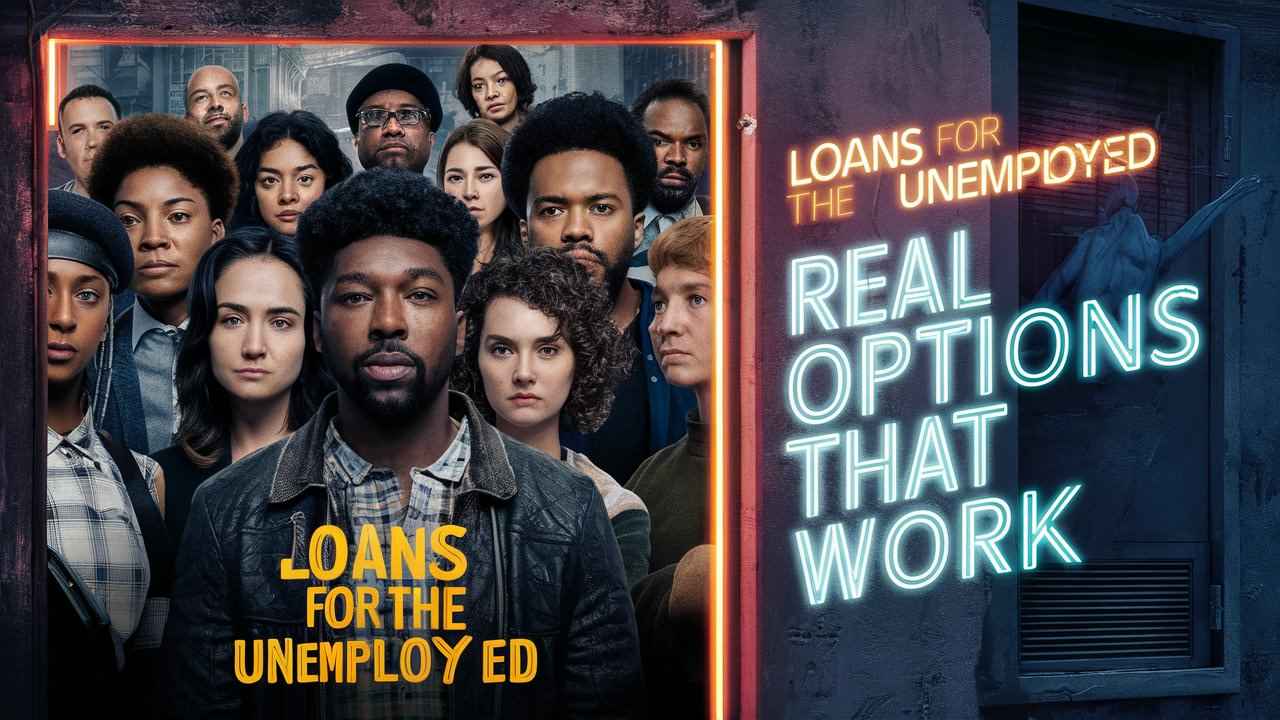Facing Financial Struggles Without Employment
The Emotional Impact of Unemployment on Finances
Losing a job is not just a financial setback – it’s an emotional rollercoaster. The financial strain can feel like a weight on your chest, especially when bills pile up and savings dwindle. Unemployment often brings feelings of frustration, anxiety, and uncertainty about the future. But remember: while unemployment may seem like a dead-end, it’s not a financial death sentence. You’re not alone in this struggle, and there are loans for the unemployed that can offer a lifeline when things get tough.

Why Finding a Loan While Unemployed is Not Impossible
Contrary to popular belief, securing a loan without a regular paycheck isn’t a fairy tale. Lenders are willing to extend credit to individuals who have steady income, even if that income isn’t from a full-time job. Whether you’re receiving government benefits, freelancing, or earning passive income, there are options available that can help you bridge the gap during tough times. Hope is not lost; the world of lending has room for the unemployed.
Understanding the Options Available: Yes, There is Hope
There’s no shortage of options when it comes to borrowing money while unemployed. Personal loans, payday loans, or even government grants may be the solution. The key is understanding what works for your situation. Sure, unemployment is challenging, but it doesn’t have to define your financial future.

Understanding Loans for the Unemployed
What Defines an Unemployed Loan?
Simply put, an unemployed loan is any loan available to individuals who do not have a steady paycheck. It’s not about whether you’re employed or not; it’s about your ability to repay. These loans might come with higher interest rates due to the perceived risk, but they offer a glimmer of financial freedom when you need it most.
How Lenders Assess the Unemployed: Income Isn’t Everything
Lenders look at many factors besides just employment status. They want to see that you have a consistent, reliable income from other sources💰like gig work, freelance jobs, or government assistance. It’s not the 9-to-5 job that matters; it’s the stability of your cash flow and your ability to prove that you can repay what you borrow.
Can You Qualify? Debunking Myths About Employment Status
One of the most common myths about borrowing money while unemployed is that you’re automatically disqualified. That couldn’t be further from the truth! Lenders are more focused on your financial situation and your repayment plan. Whether you’re hustling as a freelancer or living off investments, the key is proving that you can meet your financial obligations.💰

Key Factors Lenders Consider for Unemployed Borrowers
Income Sources: Proving There’s Money Coming In
Even if you’re not employed full-time, proving that you have an income is crucial. Lenders want to know that you have cash flow to cover monthly repayments. Whether it’s from part-time gigs, freelance projects, or alimony, document all your income sources to increase your chances of approval.💰
Credit Score’s Role in Getting Approved
Your credit score remains one of the most important factors when applying for a loan. A higher credit score increases your chances of getting a loan with favorable terms. While being unemployed can make the approval process trickier, a strong credit score can tip the scales in your favor.
Collateral and Co-Signers: Safety Nets That Work
If your income is limited or unstable, offering collateral or securing a co-signer could boost your chances of approval. Collateral can include assets like a car, jewelry, or real estate. A co-signer with a solid credit history can reassure lenders that they’ll get their money back, even if you’re not employed full-time.💰
Why Your Ability to Repay Matters More Than Your Job Title
When lenders assess your loan application, they care less about your job title and more about your ability to repay. Can you afford the loan? Will you be able to make payments on time? Proving that you have a plan for repayment is key to securing a loan, even if your job status is less than traditional.

Types of Loans Available for the Unemployed
Personal Loans: The Flexible Option for Non-Salaried Individuals
Personal loans are among the most flexible borrowing options for the unemployed. They’re unsecured, meaning you don’t need to put up any collateral, and you can often borrow relatively large amounts. The catch? Interest rates are typically higher since you’re considered a higher-risk borrower without a steady income. But don’t fret; if you have strong credit and reliable income from other sources, personal loans can be an excellent option.💰
Secured vs. Unsecured Loans: The Pros and Cons of Each
When borrowing money as an unemployed person, you’ll likely encounter two types of loans: secured and unsecured. A secured loan requires collateral, such as your home or car, while an unsecured loan doesn’t. Secured loans can offer lower interest rates, but if you miss payments, you risk losing your collateral. Unsecured loans are riskier for lenders, so they usually come with higher interest rates, but there’s no collateral involved.💰

Payday Loans: Quick but Risky – What to Know
Payday loans are tempting, especially when you need cash fast. However, the high-interest rates and short repayment terms can trap you in a cycle of debt. If you’re considering payday loans, proceed with caution. They’re an expensive way to borrow money, and defaulting can hurt your credit score.
Cash Advances from Credit Cards: The Option Hiding in Plain Sight
If you have a credit card, you may be able to access a cash advance. This option is quick, but like payday loans, it comes with high interest rates and fees. Still, if you’re in a pinch, a credit card cash advance might be the least risky option compared to payday loans.
Government Assistance Loans: What’s Available for You
Did you know that there are government-backed loan programs designed to help unemployed individuals? These loans are often more flexible than traditional loans, with lower interest rates and better repayment terms. Some government programs also offer grants that don’t need to be repaid, providing relief without the looming threat of debt.

Alternative Income Sources That Improve Loan Approval Chances
Freelancing, Gig Work, and Side Hustles – Showing Lenders You Can Earn
The gig economy is booming, and lenders are starting to recognize freelance and gig work as legitimate income sources. If you’re unemployed, showing that you have a steady stream of freelance work, side gigs, or even online sales can help boost your loan application. The key is showing that you’re resourceful and capable of maintaining a consistent income, even if you’re not working a traditional job.
Social Security Benefits, Pensions, and Disability Payments
For some unemployed individuals, income doesn’t come from a paycheck but from government benefits, social security, or disability payments. These are all valid income sources, and many lenders will accept them when evaluating loan applications. Be sure to have documentation to prove that these sources are stable and ongoing.
Rental Income and Investment Dividends: Unexpected Avenues
If you have a property that generates rental income or investments that provide regular dividends, these are legitimate income sources that can be used to secure a loan. Lenders will assess whether you can cover loan repayments from these passive income streams, so don’t overlook these assets when applying for a loan.
Alimony and Child Support as Legitimate Income Sources
In many cases, alimony and child support payments count as income for loan approval purposes. These steady payments can help you qualify for a loan, especially when your other income sources are limited.
The Role of Credit Scores for Unemployed Loan Seekers
Why Credit Scores Matter When You’re Jobless
Your credit score is an indication of your financial responsibility, and it plays a major role in determining whether you can secure a loan while unemployed. Even without a traditional job, lenders will often look at your credit history to gauge your ability to repay. A solid credit score can compensate for a lack of employment, increasing your chances of approval.
Tips to Improve Your Credit Score Without a Paycheck
Don’t panic if your credit score isn’t perfect. There are steps you can take to improve it, even if you’re unemployed. Start by paying off any existing debts, reducing your credit card balances, and disputing any errors on your credit report. These small steps can improve your score over time and increase your chances of loan approval.
How to Get a Loan with Bad Credit While Unemployed
It’s tough to get a loan with bad credit and no job, but it’s not impossible. Look for lenders who specialize in bad credit loans, or consider getting a co-signer with good credit. With a clear repayment plan and the right documentation, you may be able to secure the funds you need.
Strategies for Finding Lenders That Accept Unemployed Applicants
Which Lenders Specialize in Loans for Unemployed Individuals?
Some lenders are more open to working with unemployed individuals than others. Online lenders like Upstart, LendingClub, and Prosper specialize in offering loans to borrowers with non-traditional income. Traditional banks, on the other hand, may be more rigid in their requirements. Always shop around and consider lenders that specialize in offering loans for the unemployed.
Online vs. Traditional Lenders: Finding Your Best Match
When looking for a loan, you’ll face a choice between online lenders and traditional institutions like banks and credit unions. Online lenders often have more flexible approval processes, but they may charge higher interest rates. Traditional banks may offer lower rates, but they typically have stricter qualification criteria. Assess your situation carefully and choose the lender that offers the best terms for you.
Comparing Interest Rates and Loan Terms to Avoid Debt Traps
Before committing to any loan, compare interest rates, repayment terms, and any fees associated with borrowing. A low-interest rate might sound appealing, but if the repayment term is short, the monthly payments could be unmanageable. Always read the fine print to avoid getting caught in a debt trap.
Navigating the Application Process When You’re Unemployed
Gathering the Right Documents for a Smooth Application
When applying for a loan as an unemployed individual, the documentation you provide can make or break your application. Lenders typically require proof of income (even if it’s from freelance work or government benefits), bank statements, and details of any assets you may have. The more thorough and organized your documentation, the smoother the application process will be.
Crafting a Strong “Ability to Repay” Narrative
Lenders want to know how you plan to repay the loan, so it’s crucial to craft a compelling narrative. Highlight your other income sources, explain any gaps in employment, and demonstrate your financial responsibility. A clear repayment plan can go a long way in convincing lenders that you’re a reliable borrower.
Tips for Providing Proof of Alternative Income
If your income isn’t from a traditional job, make sure you have documentation to back it up. This can include contracts for freelance work, tax returns showing income from investments, or official statements from government agencies regarding social security or disability payments.
Getting a Co-Signer for Better Loan Approval Odds
Who Makes a Good Co-Signer for an Unemployed Loan?
A co-signer is someone who guarantees the loan and agrees to pay it back if you can’t. The best co-signer is someone with a strong credit history, a stable income, and a willingness to take on the responsibility. Ideally, they should be financially secure and understand the risks involved.
How a Co-Signer Can Reduce Your Interest Rate
A co-signer can significantly reduce the interest rate on your loan, since their good credit and income can offset the risk of lending to an unemployed borrower. Be sure to discuss the terms with your co-signer and agree on a plan for repayment to avoid straining your relationship.
Convincing Someone to Co-Sign Without Straining Relationships
Asking someone to co-sign a loan is a big ask. Be honest about your financial situation and outline how you plan to repay the loan. Open communication is key to keeping your relationships intact while getting the financial help you need.
Considering Collateral to Secure Your Loan
What Items Make Good Collateral When You’re Unemployed?
When unemployed, offering collateral can help you secure a loan. Good collateral includes things like your car, jewelry, or real estate. Just be aware that if you can’t make the payments, you risk losing these assets. Always carefully consider what you’re willing to put at stake before agreeing to a secured loan.
Risks and Rewards of Secured Loans
Secured loans can be an excellent way to get access to funds, especially when you’re struggling with unemployment. The risk is losing your collateral if you default on the loan, but the reward is getting lower interest rates and better approval odds.
How to Keep Your Assets Safe While Borrowing
If you do choose to offer collateral, make sure you have a solid repayment plan in place. Set up reminders for payments, and avoid taking on too much debt to ensure you can keep your assets secure.
Pros and Cons of Payday Loans for the Unemployed
The Appeal of Payday Loans – Why They’re Tempting
Payday loans are short-term loans that can be tempting when you need cash fast. They’re quick and easy to access, often with little more than a paycheck stub as documentation. But, as convenient as they are, payday loans come with significant drawbacks.
High Interest Rates and Short Terms: How They Can Hurt You
The downside of payday loans is their high interest rates and short repayment periods. Borrowing a small amount can quickly snowball into a much larger debt if you can’t repay on time, and fees can stack up quickly.
Alternatives to Payday Loans That Won’t Break the Bank
Instead of opting for payday loans, consider alternatives like personal loans from reputable online lenders, or government assistance programs. These options often offer lower rates and more flexible repayment terms, saving you from falling into a cycle of debt.
Government and Nonprofit Loans: Options You May Not Know About
Unemployment Benefits and Financial Support Programs
Some government programs offer loans for the unemployed, especially for individuals who are receiving unemployment benefits or are facing financial hardship. Programs like Temporary Assistance for Needy Families (TANF) or Social Security loans may provide relief without needing repayment. Be sure to research local government initiatives that may be available to you.
Local Nonprofits Offering Small Loans or Grants
Many local nonprofits and community organizations offer small loans or grants to individuals experiencing unemployment. These loans tend to have favorable terms, including low or no interest rates, and can be a good option for those in need of urgent financial help.
Emergency Cash Assistance from Government Programs
Emergency cash assistance programs may be available in your area, providing financial relief for unemployed individuals struggling to make ends meet. These programs are often designed to help with immediate expenses like rent or utilities, offering a temporary financial cushion until you’re back on your feet.
Exploring Personal Loans from Family and Friends
How to Approach Family or Friends for a Loan
If you’re unemployed, asking friends or family for a loan might feel uncomfortable, but it can be a viable option. Be transparent about your financial situation, and propose a clear repayment plan to show that you intend to honor your commitment.
Creating a “Family Loan” Contract to Keep Things Clear
To avoid misunderstandings, it’s a good idea to create a formal agreement when borrowing from family or friends. This contract should outline the amount, repayment schedule, and any interest charges, keeping the terms clear and protecting everyone involved.
The Potential Impact on Relationships: Is It Worth It?
While borrowing from loved ones can be helpful, it can also strain relationships. If you’re considering a family loan, weigh the potential emotional cost against the financial benefit. Sometimes, it’s better to explore other options to preserve your relationship.
Budgeting Tips to Support Loan Repayment While Unemployed
Setting a Realistic Budget to Ensure On-Time Payments
Creating a budget is essential when you’re unemployed and relying on loans to make ends meet. Track all your income and expenses, set aside money for loan repayments, and cut back on unnecessary spending. A well-crafted budget will ensure you stay on track and avoid late payments.
Cutting Unnecessary Expenses Without Feeling Deprived
Being on a tight budget doesn’t mean living like a hermit. Find ways to cut costs without sacrificing your quality of life💰 ditch that daily coffee run, cut the cable, or swap a few takeout meals for home-cooked ones. Little changes can make a big difference.
Boosting Income Through Creative, Non-Traditional Methods
Even if you’re unemployed, there are creative ways to boost your income. Sell unused items, take on short-term gigs, or even start a side hustle. Anything that adds to your bottom line helps ensure you can repay loans without further stress.
Avoiding Scams and Predatory Lenders While Seeking a Loan
Recognizing the Signs of Predatory Lending Schemes
When applying for loans as an unemployed individual, be wary of lenders who promise fast money with no credit check. These are often predatory loans designed to trap borrowers in endless debt. Watch for high fees, unreasonably high interest rates, and vague terms that leave you in the dark.
Why “Too Good to Be True” Offers Are Dangerous
If an offer sounds too good to be true, it probably is. Steer clear of lenders offering “guaranteed” approvals or seemingly unbelievable rates. These are usually red flags, and falling for them could lead to financial disaster.
How to Research and Vet Any Lender
Before taking out a loan, research the lender thoroughly. Look for reviews, check their BBB rating, and verify that they’re licensed to operate in your state. A trustworthy lender will be transparent about their fees and terms, and won’t hide behind a curtain of secrecy.
The Importance of a Repayment Plan for Financial Stability
Creating a Clear Plan Before Taking on Any Debt
Before committing to a loan, have a clear plan for how you’ll repay it. Factor in all your income sources, expenses, and any other obligations you may have. The clearer your plan, the easier it will be to manage your debt and avoid financial strain.
Setting Up Auto-Payments and Reminders
Automating payments is one of the easiest ways to stay on top of loan repayments. Set up auto-payments through your bank or lender, or use reminder apps to ensure you never miss a payment. This takes the guesswork out of managing your debt and keeps your credit score intact.
What to Do if You’re Struggling to Make Payments
If you’re having trouble making payments, don’t ignore the issue. Reach out to your lender to discuss alternative repayment options, or look into
debt relief programs. The sooner you act, the better the chances of finding a workable solution.
Rebuilding Your Financial Foundation While Unemployed
Paying Off High-Interest Debt First for Stability
While unemployed, it’s important to focus on paying off high-interest debt first. These debts can quickly become unmanageable, and paying them off will help you regain financial stability and peace of mind.
Creating an Emergency Fund – Even If It’s Small
Even if you’re out of work, try to build a small emergency fund. Start with a goal of $500, and work your way up. This cushion will help you avoid taking on more debt in the future and give you peace of mind.
Learning Financial Skills to Avoid Debt Dependency
Finally, take the time to learn about personal finance. Understanding budgeting, saving, and investing will help you avoid debt traps in the future and empower you to take control of your financial future.
Resources and Support for the Unemployed in Need of Financial Assistance
Free Financial Counseling Services and Hotlines
Numerous organizations offer free financial counseling for those who are unemployed. These professionals can help you create a budget, deal with creditors, and find financial assistance programs. Take advantage of these services to get back on your feet.
Online Communities and Support Groups for Job Seekers
Being unemployed can feel isolating, but you’re not alone. Join online communities and support groups for job seekers. These groups can provide moral support, practical advice, and job leads that can help you through tough times.
Educational Tools and Resources for Budgeting and Finance
There are plenty of online tools and resources to help you budget and manage your finances effectively. Websites, apps, and courses can teach you how to manage debt, build an emergency fund, and plan for a secure financial future.
Case Studies: Real Stories of Unemployed Individuals Who Found Loans
Stories of Success: How They Got a Loan Without Employment
Meet Sarah, a single mother who lost her job but was still able to secure a loan for the unemployed by showing proof of her side hustle and freelance work. Or James, who used his rental income to qualify for a personal loan, despite being out of work.
Common Mistakes Unemployed Borrowers Made
However, not all stories have a happy ending. Many unemployed borrowers fall prey to payday loans, high-interest rates, or poorly researched lenders. The key takeaway? Do your homework and know what you’re getting into before signing anything.
Lessons Learned and Tips from Real Experiences
The most important lesson is that unemployed individuals can access loans, but it requires preparation and careful consideration. Always assess your ability to repay, choose the right lender, and don’t be afraid to ask for help.
Loan Alternatives That Don’t Require Repayment
Grant Programs That Offer Relief to the Unemployed
If you’re looking for options that don’t require repayment, consider grant programs. Many non-profits and government agencies offer grants to assist unemployed individuals. These funds can help cover living expenses, job training, or emergency costs.
Crowdfunding Platforms for Emergency Support
Crowdfunding platforms like GoFundMe can help you raise funds for emergency needs without the burden of repayment. Share your story, and your friends, family, and even strangers might pitch in to help you get back on your feet.
Selling Items or Freelancing for Quick Cash
If you need immediate cash and don’t want to take on debt, consider selling items you no longer need or starting a freelance job. It’s a quick way to generate some income without the long-term obligations of a loan.
Final Thoughts: Taking Control of Your Financial Future
While being unemployed can certainly create financial challenges, it doesn’t have to spell financial ruin. With the right mindset, strategies, and support, you can navigate the world of Loans for the Unemployed and emerge on the other side stronger than ever. Stay educated, make smart decisions, and take charge of your financial future💰 because, despite what you may think, unemployment isn’t the end of the line, it’s just the beginning of a new chapter.
People Also Ask
Can I get a loan if I’m unemployed?
Yes, it is possible to get a loan even if you are unemployed. Lenders often consider various factors beyond just employment status, including other sources of income, credit score, and your ability to repay. While securing a loan may be more difficult, it’s not impossible.
What types of loans are available for unemployed individuals?
There are several types of loans available for unemployed individuals. These include:
- Personal loans: These loans can be used for a variety of purposes and may be unsecured or secured by collateral.
- Payday loans: Quick, short-term loans with high interest rates.
- Government assistance loans: Loans provided by government programs aimed at helping those out of work.
- Secured loans: Loans where you offer assets as collateral to reduce risk for the lender.
- Credit card cash advances: If you have a credit card, this can be an immediate option.
How can I qualify for a loan without a job?
To qualify for a loan without a job, you’ll need to prove you have other income sources such as freelance work, government benefits, investments, or alimony. Lenders will also consider your credit score and the availability of collateral or a cosigner.
Are there loans specifically for people who are temporarily out of work?
Yes, some lenders offer loans tailored for individuals who are temporarily out of work. These are often short-term loans or lines of credit designed to help people bridge the gap between jobs. Government assistance loans may also apply in these situations.
Do I need a cosigner to get a loan if I’m unemployed?
A cosigner can improve your chances of securing a loan, especially if your income is limited or you have a low credit score. A cosigner guarantees the loan, which reduces the lender’s risk and can help you qualify for better terms, such as a lower interest rate.
Can I use unemployment benefits as income for a loan?
Yes, you can use unemployment benefits as income when applying for a loan. Lenders typically accept unemployment benefits, social security, disability payments, or other government assistance as legitimate sources of income, especially if you have no other steady income.
What’s the best loan option if I have no income but need quick cash?
If you have no income but need quick cash, a payday loan or a cash advance from a credit card might be an option, although these come with high fees and interest rates. It’s important to assess the risks and ensure that you can repay it on time to avoid falling into debt.
How does my credit score impact my chances of getting a loan while unemployed?
Your credit score plays a significant role in determining your ability to secure a loan while unemployed. A higher score will increase your chances of approval, even without a steady income. However, if your credit score is low, you might face higher interest rates or be required to provide collateral or a cosigner.
Are there loans available if I’m unemployed and have bad credit?
Yes, there are loans available for individuals with bad credit, even if they are unemployed. However, these loans usually come with higher interest rates and stricter terms. Options include secured loans, payday loans, or loans from online lenders who specialize in bad credit.
How high are the interest rates for loans for unemployed people?
Interest rates for loans taken by unemployed individuals can be significantly higher than for those with stable jobs. Lenders view these loans as higher risk, so expect higher interest rates, especially for payday loans or loans without collateral.
Can I get a loan if I only have income from government benefits?
Yes, you can qualify for a loan with government benefits as your income, such as unemployment benefits, social security, or disability payments. Lenders often accept these as valid sources of income, but your ability to repay the loan will also factor into the approval process.
What’s the difference between secured and unsecured loans for the unemployed?
- Secured loans require collateral (such as your car or home) to back the loan. These are generally easier to get and come with lower interest rates since the lender can seize your collateral if you default.
- Unsecured loans don’t require collateral but often come with higher interest rates since the lender is taking on more risk. These loans depend more on your creditworthiness and income.
Are payday loans a good option for someone without a job?
Payday loans can be a tempting option for someone who is unemployed and needs quick cash. However, they come with high interest rates, short repayment terms, and can trap borrowers in a cycle of debt if not repaid promptly. It’s important to use payday loans as a last resort and explore other alternatives first.
Can I get a personal loan if I have only part-time or freelance income?
Yes, you can get a personal loan if you have part-time or freelance income, though lenders may require more documentation to verify your income. Your ability to repay the loan will be a key factor, and your credit score will also influence your chances of approval.
How can I improve my chances of getting approved for a loan without employment?
To improve your chances of approval, focus on increasing your credit score, gathering proof of alternative income (such as freelance work or benefits), and considering a cosigner or collateral. Additionally, ensuring you have a solid repayment plan can help reassure lenders.
Are there any risks to taking out a loan when I’m unemployed?
Yes, there are risks to taking out a loan while unemployed. These include higher interest rates, the risk of defaulting on the loan if your financial situation doesn’t improve, and potentially losing collateral if you opt for a secured loan. Make sure to carefully assess your ability to repay before borrowing.
What repayment options are typically offered to unemployed borrowers?
Repayment options for unemployed borrowers can vary depending on the lender. Some may offer deferred payments, extended repayment terms, or lower monthly payments. Be sure to inquire about flexible options when applying for a loan, as they can help ease the financial burden.
Can I qualify for a loan if I’m in between jobs?
Yes, if you are between jobs, you can still qualify for a loan by demonstrating other sources of income, such as freelance work, severance pay, or unemployment benefits. Lenders may be more lenient if you can show that the job loss is temporary and that you can make repayments.
How does a debt consolidation loan work for unemployed individuals?
A debt consolidation loan combines multiple existing debts into one single loan, typically at a lower interest rate. For unemployed individuals, these loans may be more difficult to qualify for, but if you have alternative income sources or a cosigner, this could be a viable option to simplify debt repayment.
Are there alternatives to loans for people without steady income, such as lines of credit?
Yes, there are alternatives to traditional loans for individuals without steady income, such as lines of credit. A line of credit can offer more flexibility than a loan, allowing you to borrow as needed up to a set limit. However, like any credit, it should be used wisely to avoid accumulating excessive debt.











